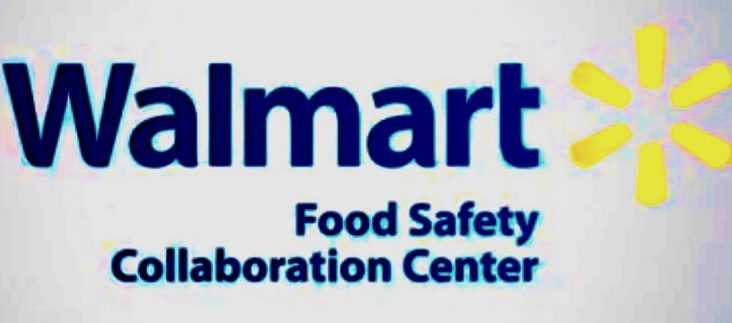Walmart China invites U.S. entrepreneurs to innovate for food safety pipeline
by June 11, 2019 2:33 pm 1,639 views

Northwest Arkansas is a hub for supply chain and food safety expertise and Walmart China is taking note.
The Walmart Food Safety Collaboration Center (WFSCC) in China is calling on entrepreneurs from around the globe to take part in the third round of the Walmart Food Safety Innovation Pipeline. Specifically, the center is requesting proposals from entrepreneurs to innovate new ideas to solve challenges in food safety through technology.
Rebecca Liu, corporate spokeswoman for Walmart, told Talk Business & Politics the event brings together innovators from various disciplines to identify critical food safety issues and provide fresh thinking on solutions. She said the innovation pipeline ultimately aims to fast-track the most promising solutions by testing them in the real world supply chains of Walmart and its partners.
Liu said Walmart’s Food Safety Collaboration Center is three years old and is part of the retail giant’s commitment to ensuring more transparency in the food supply chain. Walmart CEO Doug McMillon officially launched the third round on May 30 in China. He encouraged innovators to take part and submit a proposal.
“Together we can innovate for safer food and improve the lives of people in China and around the world,” McMillon added.
Walmart said agricultural products and other commodities are transported on a large scale in China. But the formation of a complete supply chain, especially a cold chain, is just getting started. The first problem of transporting commodities along the supply chain is the occurrence of an information break in the chain. A second problem is the loss of information being transmitted. Walmart said it’s important for the supply chain to carry information up and down the chain, which is why the Chinese government called for traceability improvements.
The third problem is the misuse of the supply chain and covering up defective or unlicensed products. The fourth challenge is the accumulation of risks as commodities move through the supply chain.
“The food supply chain is a complex system where a mistake anywhere can jeopardize the safety of the whole. We hope to reduce such risks by exploring new technologies in food production, logistics, retail, and last mile delivery. Through technology, we can digitally shrink the distance between nodes of the supply chain, advance transparency, and empower consumers,” said Will Watts, senior director of the WFSCC.
WFSCC is already using the Internet of things, blockchain, artificial intelligence and cloud computing to tackle some of the challenges with the complex global food supply chain.
Liu said in this round Walmart is focusing on supply chain insights that advance transparency and improve food safety from farm to fork. The retailer is seeking domestic and overseas innovators to take part in this event. Dr. Yan Zhinong, WFSCC executive director, said previous round finalists have already achieved commercial success. He said past winners have also brought a positive impact to the food safety industry.
“We initiated the Innovation Pipeline to bring together resources from all parts of the supply chain to promote innovation and enhance food safety. The diverse innovative solutions collected will not only be applied to Walmart’s operations but also benefit the entire industry,” he said.
The submission period for Round 3 of the Innovation Pipeline began May 30 and runs through July 19. Following are key stages after the project submission period.
• Announcement of Finalists (Aug. 2):
Finalists will be selected and enter the guidance and mentorship stage. Finalists will receive mentoring from members of the Innovation Council and will have the opportunity to visit their enterprises onsite.
• Submission of Final Proposals (Sept. 9):
Selected finalists will make adjustments and improvements to their proposals according to the advice gained from Innovation Council members before submitting their final proposals.
• Innovation Draft Day (Late September):
Finalists will present their projects to the Innovation Council during this final event in Shenzhen. Selected finalists will receive the opportunity to pilot their project with Walmart China and the Innovation Pipeline’s partners.
Liu said since the Innovation Pipeline was first launched in 2017, more than 70 proposals have been gathered from various fields including cold chain management, sustainable packaging, product traceability and rapid testing. She said all the participating enterprises received guidance from the Innovation Council. Some of the winning projects earned the opportunity to partner with Walmart China on pilot projects, or explore other business applications.
For more information about the Innovation Pipeline Round 3, including a complete timeline, requirements, and application forms, visit the website of the Walmart Food Safety Collaboration Center. The Request for Proposal Application can be downloaded on that site, although you have to select English from the language tab.
Technology theft is an issue behind the ongoing trade tiff between the U.S. and China. Walmart said the food safety project works with the Chinese government and has done so since opening the Collaboration center three years ago, according to Liu, adding that the consortium allows companies to drop their competitive guards and work together. Walmart also contends that, for an entrepreneur, the chance to problem solve with Walmart on a global scale outweighs the risk of being ripped off.
